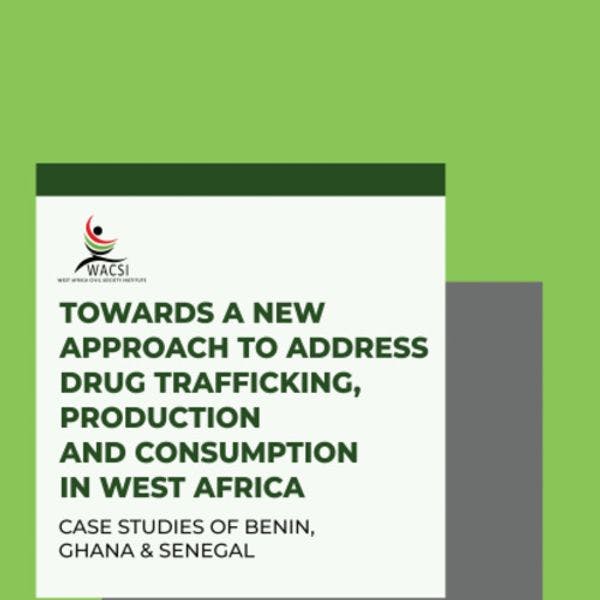Vers une nouvelle approche pour répondre au trafic, à la production et à la consommation de drogues en Afrique de l’Ouest : Etudes de cas au Bénin, Ghana et Sénégal
WACSI offre une vue d’ensemble des défis majeurs liés aux drogues et propose des recommandations pour les surmonter. Pour en savoir plus, en Anglais, veuillez lire les informations ci-dessous.
The research was largely based, on the one hand, on content analysis of legal and policy documents, academic journals, media reports and other state and non-state actors’ reports, and on the other hand on interviews of individuals and focus groups comprising of drug dealers, traffickers, people who use drugs and their relatives as well as clinicians, government and security officials.
This composite report summarises and brings together the main findings of each of the three country-specific reports. The main findings are grouped into five broad areas, namely: i) state of drug market ii) impacts of drugs on the state and society iii) national frameworks and actions against illegal drugs, iv) challenges and constraints, and v) actions points to effect positive change. Before delving into the research findings in each of the three countries, a brief overview of the regional perspective on how drug trade and use is addressed in the region is presented.
West Africa has become an important hub for the global trade of illegal drugs. Psychoactive drugs are substances that either stimulate (such as cocaine or amphetamines) or inhibit (such as heroin or sedative-hypnotics) the central nervous system or cause hallucinogenic effects (such as marijuana or LSD) to the effect that their use has been prohibited globally (International Encyclopedia of the Social & Behavioral Sciences, 2001). According to report of the United Nations Office on Drugs and Crime, (UNODC, 2016), Africa is the second main market for cannabis in the world after the Americas. Between 2009 and 2014, West Africa accounted for 78% of the total cocaine seizures in Africa (World Drug Report, 2016). Equally worrying is the rising number of clandestine laboratories in West Africa producing synthetic drugs including methamphetamine. It is estimated that the West African region is now producing up to 1.5 tonnes of methamphetamine every year.
This problematic situation of the drug problem was further underscored in a report produced in 2014 by the West Africa Commission on Drugs (WACD), warning against the dangers posed by the drug trade to the democratisation process, economic growth, human rights, women empowerment and rule of law across West Africa.
In view of the growing threats of the drug trade, the regional body, the Economic Community of West African States (ECOWAS) is working through its Action Plan 2016- 2020 to promote a regional approach. Other important legal documents of ECOWAS include the Conventions on Extradition and on Judicial Assistance to fight organised crime and money laundering in West Africa. At the level of the West African Economic and Monetary Union (WAEMU), member states are mandated to establish a centralised agency to address the drug trade.
Despite the progress made in terms of providing policy and legal frameworks as well as creating specialised agencies, the regional approach towards drugs faces several challenges and constraints at the regional level. These include little inter-state cross-border collaboration and operations, no centralised regional agency and database system on the illegal drug trade and organised criminal networks, and inadequate financial, material and human resources to tackle the problem. It is evident that the challenges at regional level are a reflection of the dire situation at the level of states.
Téléchargements
Sujets
- Stimulants de type amphétamine
- Cannabis & dérivés
- Coca, cocaïne et substances associées
- Justice pénale
- Décriminalisation
- Réduction de la demande
- Développement (ODD +)
- Genre
- VIH/Sida
- Prisons et incarcération
- Nouvelles substances psychoactives
- Crime transnational et organisé
- Jeunes
- Développement et environnement
- Décriminalisation, réglementation et réforme
- Santé et réduction des risques
